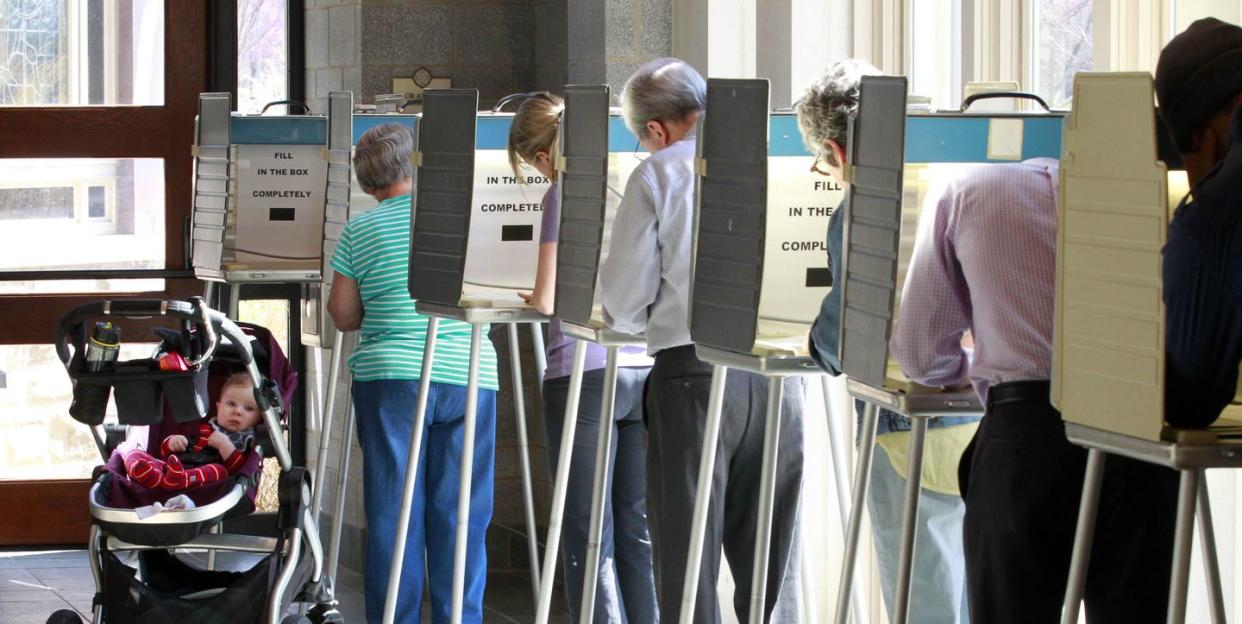Sometimes Voter Suppression Is on Autopilot. Sometimes There's Somebody Behind the Wheel.

(Permanent Musical Accompaniment To This Post)
Being our semi-regular weekly survey of what's goin' down in the several states where, as we know, the real work of governmentin' gets done and where it's locked up tight and out of range.
One of the ways that the newly insane state of North Carolina became newly insane was that a rich dude named Art Pope went out of his way to buy almost all of the state's political institutions through the simple method of subletting as many politicians as he could, which was a lot of them, as it turned out. Now, it is true that the great state of Louisiana has a long history with this kind of thing, and that elements of its politics have been insane back to the days when its political chain of command ended at Napoleon.
Nevertheless, as the Times-Picayune informs us, another rich dude is making a try down there, too, and his first big pitch is to beat Democratic Governor John Bel Edwards next month with one of his sublets named Eddie Rispone. But that's not all he's up to.
What’s remarkable about the story swirling around the Baton Rouge business titan and prolific Republican political donor isn’t that Grigsby — ahem — suggested state Rep. Franklin Foil, R-Baton Rouge, might benefit in the future if he were to drop out of a rare three-way state Senate runoff. What’s amazing is that Grigsby let his guard down and admitted that he considers himself exactly what everyone in politics knows he is.
“I’m a kingmaker. I talk from the throne,” he told the Greater Baton Rouge Business Report’s Stephanie Riegel. ...
In this case, he asked the district’s retiring senator, Dan Claitor, to let Foil know that he if allowed fellow Republican state Rep. Steve Carter to compete one-on-one against Democrat Beverly Brooks Thompson in the District 16 runoff in November, Grigsby would support Foil for a future judgeship. Claitor said he was appalled and never communicated the offer. When he found out about it, Foil said he didn’t appreciate the attempted intervention...
One way that major donors try to achieve their desired results is to spread the money around, to back a candidate for one race while promising to support another if they choose a different contest. It’s pretty common, political insiders will tell you, even if it smacks of backroom dealing. Claitor, a former prosecutor, suggested that Grigsby’s attempted intervention could even be considered illegal, and a quick reading of the law certainly does suggest it could be a question.
“No person shall knowingly, willfully, or intentionally … Give or offer to give, directly or indirectly, any money or any thing of apparent present or prospective value to a candidate for public office for the purpose of securing the candidate's withdrawal from an election,” the relevant section reads.
This is the kind of thing that used to go on until it was too late to stop it, and then everybody around the country spent years wondering how in the hell it happened. Money is how it happened. 'Twas ever thus.

One of the things to keep an eye on if and when Camp Runamuck is shut down by the Feds is to watch to see how much of what they've gained through their devil's bargain the Republicans are willing to give up or deactivate. Right now, the answer would seem to be...not very much. For example, in Ohio, voter suppression continues spectacularly and at a very rapid pace. From The New York Times:
Ms. Miller, director of the League of Women Voters of Ohio, believed thousands of voters were about to be wrongly removed. Over the summer, the Ohio secretary of state had sent her organization and others like it a massive spreadsheet with the 235,000 names and addresses that would be purged from the state’s voter rolls in just a month — a list of people that, state officials said, some part of the bureaucracy flagged as deceased, living somewhere else or as a duplicate. The League of Women Voters had been asked to see if any of those purged qualified to register again. Ms. Miller, who spends her work day helping register people to vote, scrolled through the names and then asked herself a question: What was her own voter status in the state?
She went online and discovered that her name had also been flagged as an inactive voter. The state was in the process of removing her from its voter rolls. “I voted three times last year,” said Ms. Miller. “I don’t think we have any idea how many other individuals this has happened to.” Ohio, where the Democratic presidential candidates are set to debate Tuesday, is both a battleground state and the site of some of the country’s strictest voting laws, from voter ID requirements to a “use-it-or-lose-it” provision that lets officials drop voters seen as inactive.
Gee, what are the odds on that? Pretty good in Ohio, anyway.
This year, a group of elected officials in the state, mostly all moderate Republicans, tried to answer the concerns with an experiment of their own: Rather than purge the voter rolls behind closed doors as had been done in the past, the government released the full list of those to be removed this summer, and gave the list to advocacy groups. The groups said they found the list was riddled with errors.
The result: Around 40,000 people, nearly one in five names on the list, shouldn’t have been on it, the state determined. And it found out before anyone was actually turned away at a polling place largely because of volunteer sleuthing. Few people had expected a problem at that scale...And voting rights groups found an unexplained tranche — around 20,000 people — who had been marked to be purged because of inactivity in future election cycles, but were actually active voters in previous Ohio elections. These voters were in Franklin County, a Democratic stronghold in the state.
This looks like a good-faith effort that discovered to its surprise that voter-suppression laws are designed to operate on automatic pilot. And, if it weren't for some amateur sleuthing by some interested citizens, it might not have been discovered at all.
“If you look at the numbers, it’s hard not to be jaded by this,” said Steve Tingley-Hock, who runs a watchdog group called the Ohio Voter Project and initially discovered the error. How Mr. Tingley-Hock, a volunteer who doesn’t work for the government, chanced upon such a big mistake shows the kind of unusual backstop the state now depends on to carry out its work correctly.
While what this guy has done is admirable, it shouldn't really be necessary. The efforts of the state should be to make voting easy and fair, not glitch-ridden and difficult.

Of course, there are places where the efforts of the state are engaged to make voting hard because that keeps inconvenient voters from exercising the franchise. From CNN:
The complaint, filed Tuesday by the Wisconsin Institute for Law and Liberty against members of the Wisconsin Elections Commission, says state law requires the commission to remove from the active voting rolls voters who don't respond to a recent mailing, made as part of a regular effort to update voter rolls, within 30 days. The commission, however, says it's allowing voters to stay on the rolls through the spring of 2021, based on a June vote by the commission. ...
Last week, the commission sent out letters to about 234,000 registered voters who have told another government agency, such as a post office or Department of Motor Vehicles, they have recently moved. In her statement, Wolfe said the commission sent out the mailing based on "lessons learned" from its 2017 mailing to update the voter rolls, with an eye toward making the process more "user-friendly." One of those changes is that voters who get the mailing this year won't be automatically taken off the state's active voter list if they don't respond within a month.
In fact, Wisconsin continues to be Patient Zero for what we may see when Trumpism finally passes from the scene as an independent force. A year ago, Wisconsin elected a Democrat named Tony Evers who is attempting to govern as, you know, a Democrat. The entrenched Republican power in the legislature finds that is something up with which it will not put. And now, they're in court to prove that. From Wisconsin Public Radio:
The lawsuit, filed by the conservative Wisconsin Institute for Law and Liberty (WILL), argues Gov. Tony Evers used his veto pen on the state budget to create new laws, rather than alter language passed by the Legislature.
Oh, them again.
The lawsuit references several of the governor’s budget vetoes, including one that led to a $75 million grant program for local road projects..."Governor Evers abused his partial veto to create new laws out of whole cloth," Esenberg said in a prepared statement. "The people of Wisconsin never intended the check on legislative power the Governors’ veto represents to permit the Governor to legislate on his own." Esenberg has acknowledged previous governors have used their veto pens in a similar manner, but said his organization hasn't had the capacity to challenge the actions until now.
Well, that's a pile of rancid sheep-fat, isn't it? We were helpless until the new Democratic governor miraculously gave us both power and a concern for good government. Wingnut welfare outfits like WILL are going to outlast the current insanity, and they are not going to be chastened into changing their ways. In fact, they are going to be even more well-funded and motivated than they were before because, eventually, believe it or not, this president* is going to be just another Republican victim of the liberal coastal elites. They're going to be raising money even off the rotting corpse of this administration*.
And we conclude, as is our custom, in the great state of Oklahoma, where Blog Official Waterhole Spelunker Friedman of the Plains bring us another sad tale of what can happen when math is involved. From News4:
Johnson & Johnson says there was a miscalculation of $107 million in the $572 million judgement. Company attorney Steve Brody said, "The state has not offered an explanation or pointed to any evidence that suggests that it was anything other than a simple typographical error." The judge admitted there was a mistake in the calculation. "I acknowledge the computing error contained in my August 26th judgement. The cost for Johnson & Johnson to pay is $107,683," Cleveland County Judge Thad Balkman said. Part of that money will go toward funding for neonatal care.
That this is back in litigation is proof positive that our legal system needs reform. Or a decent calculator.
This is your democracy, America. Cherish it.
Respond to this post on the Esquire Politics Facebook page here.
You Might Also Like

